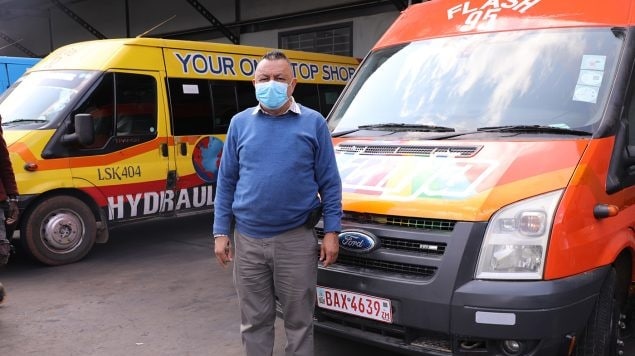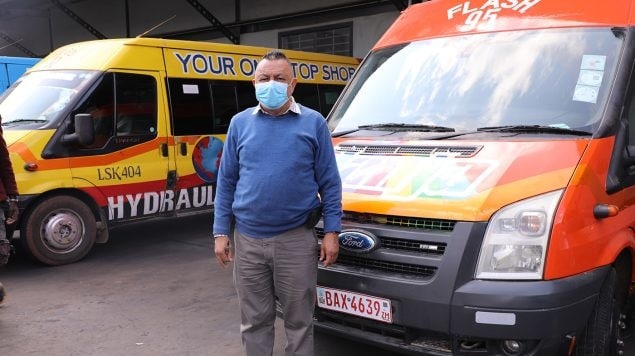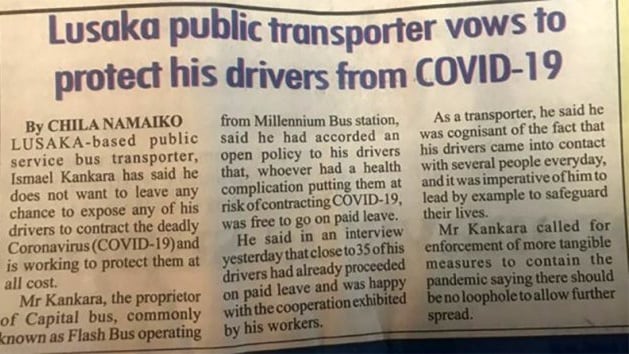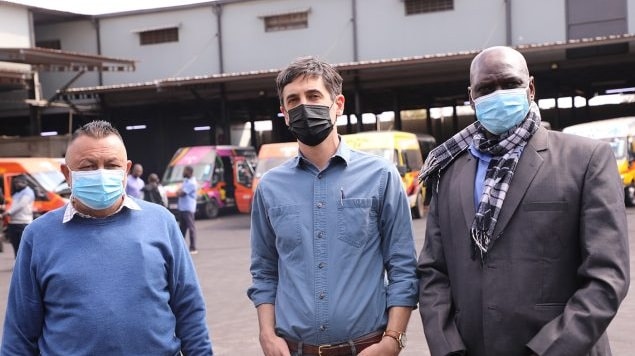At a glance
CDC in Zambia worked closely with local government and health officials to establish COVID-19 testing, study the spread of the disease, and increase vaccinations. A local community leader helped stop the spread in his community.

The challenge
In the early weeks of the COVID-19 pandemic, as cities around the world were reporting large deadly outbreaks of the disease, Zambia worked to institute public health measures as it braced for detection and confirmation of the virus.
In mid-March 2020, Zambia confirmed the first cases of COVID-19 among travelers returning from Europe. Fearing stigma related to having COVID-19, people who had close contact with the travelers were not responding to efforts by public health workers trying to conduct contact tracing and COVID-19 testing.
Health officials and staff from CDC's office in Zambia started efforts to reach those with close contact to the first COVID-19 patients in the country.
Approach
Local business owner helps health officials reach COVID-19 patients' contacts
A junior Zambian physician working with COVID-19 responders suggested that a local business owner could perhaps help. Zambian public health officials and the CDC team visited Ismail Khankhara, owner of the Capital Bus company in Lusaka, Zambia.
Khankhara is known as "Mr. Flash" because the buses he owns are commonly called "Flash." He is Zambian, born of Indian ancestry, who, through his business, became an influential member in the local Indian community. The people who had close contact with the first Zambian COVID-19 patients were from the same community.

Khankhara had heard about COVID-19 spreading in cities like New York and Milan and feared many Zambians would get sick. Even before the first cases of COVID-19 were detected, he helped his community stockpile important medical supplies.
As a trusted figure in his community, Khankhara was able to convince the close contacts to be interviewed and tested. His efforts helped stop the first cluster of contacts from getting bigger. No subsequent transmissions related to these first travel-related cases were detected.
COVID-19 didn't stop —neither did Mr. Flash
In the two years since the first COVID-19 cases in Zambia were confirmed, Khankhara has remained a vocal advocate for COVID-19 mitigation strategies. He also worked with community partners to buy oxygen, medical supplies, and masks for use in hospitals in Lusaka.
As the operator of a large commuter bus company in Lusaka, Khankhara followed the local government's recommendations for limiting the spread of the disease. He reduced the number of passengers on each bus, required universal masking on his buses, and offering paid sick-leave for his employees.
As a strong proponent for protecting the health of his staff, Khankhara was the first in line to get vaccinated against COVID-19 at the first of more than 10 vaccine drives he hosted at his business.
He is known for hosting health clinics before the COVID-19 pandemic. Khankhara is always the first to get an HIV test when he hosts HIV-testing campaigns at his business. As a businessman and leader in the Zambian-Indian community, Khankhara uses the opportunity to make a positive impact on the lives of others. He attributes his perspective to a teaching from his father, who said, "if you can help somebody, go out of your way to help them."
Throughout the pandemic, community leaders like Khankhara played a central role in the public health response, which requires the trust of affected populations.

Building on critical relationships to support HIV services
As Zambia faced COVID-19, it was also still dealing with the ongoing HIV epidemic among the general population. Engaging community organizations and leaders is an important strategy to reach people living with HIV. This aid for treatment and achieve very high levels of viral load suppression.
CDC works to support community-based HIV services. These relationships were the foundation for starting new COVID-19 activities over the past two years to limit the spread the disease.
Working together
CDC's long presence in Zambia and positive standing among community members has enabled it to save lives during the COVID-19 pandemic. Khankhara believes without CDC, there would have been many more deaths in Zambia.
Since the start of the pandemic, CDC has been a key partner to the Government of Zambia for its COVID-19 response. CDC staff were instrumental in strengthening COVID-19 surveillance and ensuring contact tracing early in the pandemic.
Aaron Mvula, a driver for the U.S. Embassy, helped with contact tracing. He says, "it was great to be a part of the team with CDC and the Zambia National Public Health Institute and helping to prevent people from getting infected."

Additionally, the existing laboratory network, supported by the United States President's Emergency Plan for AIDS Relief (PEPFAR), allowed Zambia to quickly establish and expand a COVID-19 testing system that detected more than 330,000 confirmed cases since the outbreak onset through October 2022.
CDC Zambia staff helped write Zambia's COVID-19 clinical management guidelines, created a home-based care model for asymptomatic and mild cases in the community, and played an important role in increasing COVID-19 vaccinations, especially among people living with HIV through PEPFAR-supported HIV care clinics and community posts.
CDC Zambia helped the Ministry of Health lead the first population-based SARS-CoV-2 prevalence study in Africa, which helped dispel the myth that the virus that causes COVID-19 skipped the continent.
CDC has been a critical partner for numerous countries to limit and control spread of COVID-19. Solid relationships, built on decades of collaboration with community members, are one key ingredient to CDC's success.
